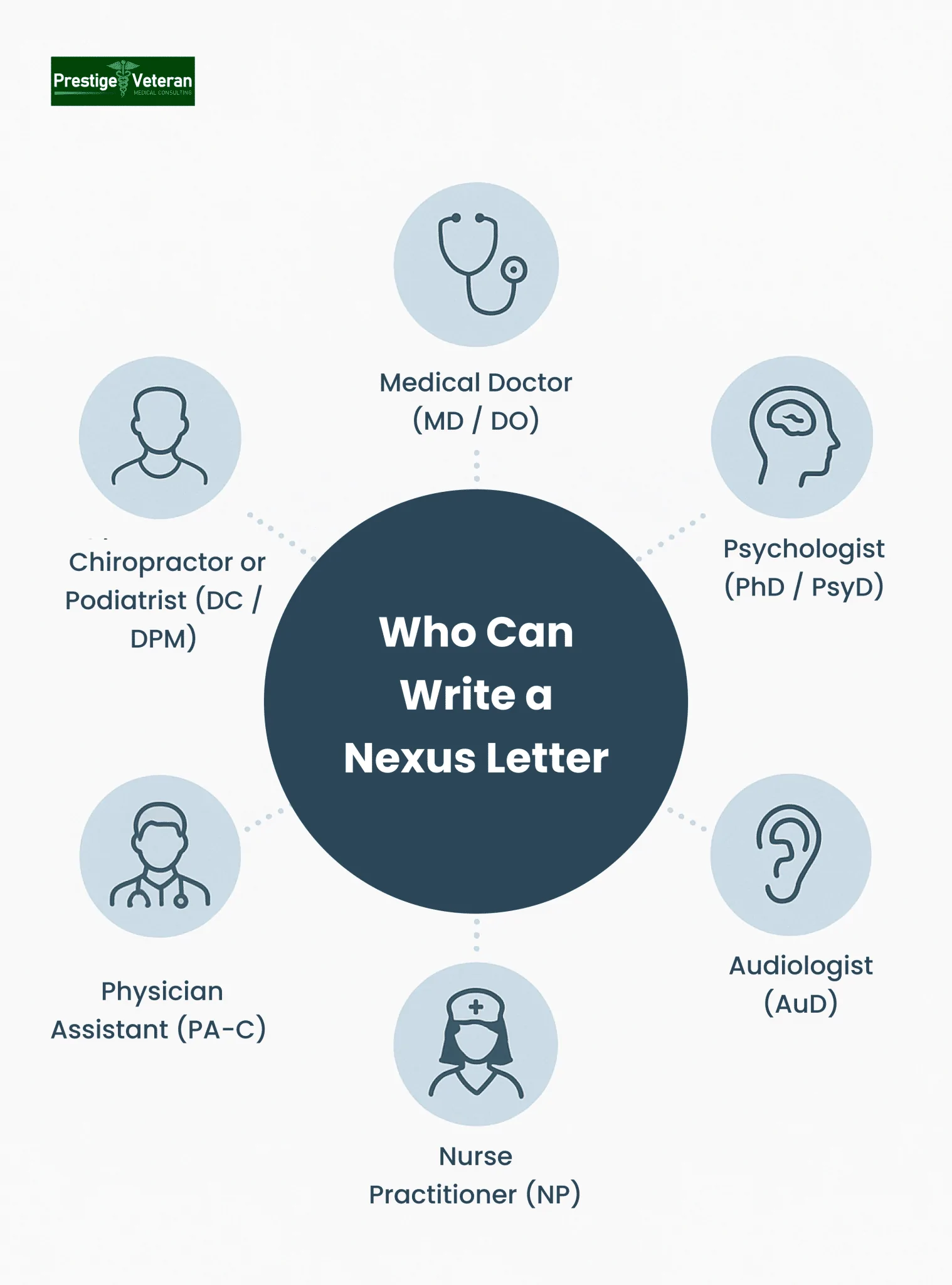Updated on August 27, 2025
Veterans often face challenges when seeking disability benefits from the Department of Veterans Affairs (VA). One crucial element that can be helpful in the process is the Nexus letter, also known as an independent medical opinion. Let’s see the basics of Nexus letters for veterans, what they are, their significance, who can write them, how to get one, and their role in establishing a service connection for a VA disability claim.

Table of Contents
Understanding Nexus Letters
Definition of Independent Medical Opinion
An Independent Medical Opinion (IMO), commonly known as a nexus letter among the veteran community, is a detailed medical report prepared by a licensed healthcare professional that connects a veteran’s current diagnosis to their military service. It includes a clear statement of probability (such as “at least as likely as not”), a review of medical and service records, and a written rationale explaining how the veteran’s condition relates to service.
For the VA to grant service connection, three elements must be met:
- A current, medically confirmed diagnosis.
- Documented evidence of an in-service event, injury, illness, or exposure.
- A nexus, or medical connection, between the current diagnosis and service event.
Because the nexus requirement is often the most contested element, a well-reasoned IMO can be critical. It not only addresses gaps in VA examinations but also provides an evidence-based explanation that connects military exposures to present conditions, helping veterans meet the burden of proof and strengthening their claim for VA benefits.
Why Nexus Letters are Important in VA Disability Claims
For veterans pursuing VA disability benefits, the most important piece of the puzzle is establishing service connection, proving that your current medical condition is “at least as likely as not” related to your military service. Even with a confirmed diagnosis, the VA will often deny a claim if that connection is missing. A nexus letter can provide that missing link in evidence.
Under the VA’s “benefit of the doubt” rule (38 CFR §3.102), if the evidence for and against your claim is in approximate balance, the decision should favor you, the veteran. However, to reach that balance, the VA requires strong, credible medical evidence written in the language of its regulations. A nexus letter fills that gap by translating your medical history into an expert opinion written in terms the VA understands.
Nexus letters are especially valuable in several scenarios:
- Direct service connection: linking injuries or illnesses to specific service events (e.g., knee injury from a parachute jump).
- Secondary service connection: showing how a service-connected condition caused or worsened another (e.g., migraines secondary to traumatic brain injury).
- Aggravation: proving a pre-existing condition permanently worsened during service.
- Chronic conditions: demonstrating continuity of symptoms since discharge.
Unlike a standard VA Compensation & Pension (C&P) exam, which may be rushed, incomplete, or unfavorable, an independent medical opinion provides a detailed, evidence-based explanation grounded in the VA’s Schedule for Rating Disabilities (38 CFR Part 4). When written by a qualified professional, a nexus letter doesn’t just supplement your claim; it can directly tip the scales in your favor, transforming a denial into a well-deserved approval of benefits.
Who Can Write a Nexus Letter?

A VA nexus letter is only as strong as the medical professional behind it. According to VA regulations (38 CFR §3.159), only licensed medical professionals with the appropriate training and credentials can provide the “competent medical evidence” needed to establish service connection. Which is why selecting the right nexus letter provider matters.
The most common providers who write nexus letters include:
Medical Doctors (MDs) and Doctors of Osteopathy (DOs): Nexus opinions from MDs and DOs often carry the greatest weight, particularly when the physician is treating you and specializes in the claimed condition. For instance, a gastroenterologist’s opinion on irritable bowel syndrome (IBS) or an endocrinologist connecting diabetes to military service tends to be highly persuasive because the VA recognizes their focused expertise.
Physician Assistants (PA-Cs) and Nurse Practitioners (NPs): Within their scope of practice, PAs and NPs can also write effective nexus letters that are fully recognized by the VA, provided they are backed by a sound medical rationale. A Physician Assistant (PA) with extensive experience in musculoskeletal medicine, for instance, can authoritatively connect chronic back pain to airborne or combat service.
Psychologists (PhD or PsyD): For mental health conditions such as PTSD, anxiety, depression, or TBI-related disorders, licensed psychologists are qualified to provide nexus opinions that the VA accepts. Their expertise in diagnosing and explaining psychiatric conditions is often pivotal to a favorable outcome.
Chiropractors and Podiatrists: For musculoskeletal and lower extremity conditions, chiropractors can connect spine and back disorders to service, while podiatrists are especially valuable in foot and ankle claims such as plantar fasciitis or flat feet.
Audiologists: For hearing loss and tinnitus, the most common service-connected disabilities among veterans, licensed audiologists can provide nexus letters supported by audiometric testing and expertise.
Why does specialty matter? The VA weighs opinions based not only on credentials but also on relevance. For example, a cardiologist linking ischemic heart disease to Agent Orange exposure holds more credibility than a non-specialist offering the same opinion.
Lay Evidence vs. Nexus Letter
Lay statements, such as buddy letters or family accounts, help describe your symptoms, daily struggles, and service history. While powerful for context under 38 CFR §3.303(a), lay evidence cannot replace a medical nexus opinion. Only a qualified healthcare professional can offer the expert link the VA requires for service connection.
When Do Veterans Need a Nexus Letter?
Not every disability claim requires a nexus letter. For certain conditions on the VA’s presumptive service connection list added by the PACT Act, published in the Federal Register, the VA automatically assumes the link to service. For example, Agent Orange–related conditions, Gulf War illnesses, and certain chronic diseases like Parkinson’s disease or diabetes mellitus type II are considered presumptive. In these cases, you do not need additional medical evidence to establish service connection.
However, veterans should consider getting a well-supported VA nexus letter when:
- Filing an initial claim for a non-presumptive condition, such as sleep apnea, orthopedic injuries, or mental health disorders.
- Submitting a supplemental claim after denial where ‘new and relevant evidence’ is required under 38 CFR §3.2501.
- Appealing to the Higher-Level Review or the Board of Veterans’ Appeals, where independent medical expertise can counter flawed VA opinions.
- Establishing secondary service connection, such as migraines secondary to tinnitus or hypertension secondary to PTSD.
- Aggravation claims, where service permanently worsened a pre-existing condition (for example, asthma aggravated by burn pit exposure).
Warning Signs You May Need a Nexus Letter
In some cases, the VA’s evidence may not fully establish the link between your condition and your service, and that’s when a nexus letter can provide the medical clarity your claim deserves. For example,
- A negative or inadequate C&P exam, especially if the examiner ignores your service treatment records or provides only a brief evaluation.
- When the VA denies your claim, citing a ‘lack of nexus,’ meaning they don’t see a direct connection between your condition and service.
- Medical opinions given by the VA examiner without explanation, using vague terms like “less likely than not” without citing evidence or medical reasoning.
These red flags in the VA disability claim process signal that obtaining an independent medical opinion may be necessary.
Nexus Letter vs. DBQ vs. IMO: What’s the Difference?
When pursuing VA disability benefits, veterans often ask: What’s the difference between a nexus letter, a DBQ, and an Independent Medical Opinion (IMO)? While these terms are sometimes used interchangeably, each serves a distinct role in building a successful disability claim for veterans.
|
Factor |
Nexus Letter |
DBQ (Disability Benefits Questionnaire) |
IMO (Independent Medical Opinion) |
|
Purpose |
Shows how a disability is linked to military service (establishes service connection). |
Describes how severe a condition is and how it impacts daily life. |
Provides an expert, in-depth medical analysis for difficult or denied claims. |
|
Who Writes It |
Licensed clinician (MD, DO, PA-C, NP, psychologist). |
VA examiner or private clinician. |
Specialist or subspecialist with advanced expertise. |
|
What It Includes |
Medical opinion using VA’s standard (“at least as likely as not”), review of service and medical records, clear rationale. |
Standardized checklist of symptoms, diagnostic codes, exam findings, and functional limits. |
Comprehensive review of records, citations to medical research, explanation tied to VA regulations. |
|
Best Use |
Proving service connection or strengthening an appeal. |
Supporting the correct rating percentage or a rating increase. |
Complex cases, multiple conditions, repeated denials, or appeals before the Board. |
|
Strengths |
Highly persuasive when detailed and backed by a qualified expert. |
Ensures VA accurately measures current severity, quickly and structured. |
Carries significant weight with detailed medical evidence; often decisive in appeals. |
|
Limitations |
Weak if generic or written by a non-specialist. |
Does not prove service connection by itself. |
More expensive and may take longer to prepare. |
1. Nexus Letter – Connecting the Dots
Who writes it: A licensed clinician such as an MD, DO, PA-C, NP, or psychologist.
What it does: A nexus letter directly links a veteran’s medical condition to military service. Using the VA’s legal standard “at least as likely as not” (a 50% probability), it explains why the disability is connected to service. A strong letter reviews service treatment records, post-service medical notes, and provides clear medical reasoning.
Pros: Nexus letters often provide a qualitative assessment, indicating whether there is a connection between the current condition and military service. Carries significant weight if detailed and backed by a qualified professional.
Cons: Weak if generic, lacks detail, or is written by someone without relevant expertise. Without this link, even strong medical records may at times fail to secure service connection.
2. Disability Benefits Questionnaire (DBQ) – Documenting Severity
Who writes it: A VA examiner or private clinician familiar with the veteran’s condition.
What it does: A DBQ is a standardized VA form designed to measure the current severity and functional impact of a disability. It records symptoms, diagnostic codes, exam findings, and how the condition affects work and daily life. For example, a Post-Traumatic Stress Disorder (PTSD) DBQ documents symptom frequency and level of occupational or social impairment, while the Knee and Lower Leg Conditions DBQ documents instability, pain, and range of motion for musculoskeletal claims.
Pros: Disability Benefits Questionnaires (DBQs) often offer a quantitative data point used by adjudicators to determine the severity of a condition. Helpful for rating increases or proving worsening symptoms.
Cons: Cannot establish service connection by itself, as it only measures severity. Its usefulness is limited unless paired with a nexus letter or IMO.
3. Independent Medical Opinion (IMO) – The Heavyweight Evidence
Who writes it: Typically, a medical specialist or subspecialist with advanced expertise.
What it does: An IMO provides a comprehensive, expert analysis that goes beyond a nexus letter. It often includes a full review of the veteran’s medical history, citations to peer-reviewed research, and detailed explanations tied to VA regulations. These opinions are especially valuable in complex claims or those repeatedly denied.
Pros: Highly persuasive before the Board of Veterans’ Appeals. Adds credibility when authored by recognized experts, particularly in specialty areas like cardiology or neurology.
Cons: More expensive and time-intensive to obtain. Usually reserved for complicated or contested cases, but can be decisive when standard evidence falls short.
Which Document Do You Need?
Each type of medical evidence serves a different role in your VA claim.
- A DBQ (Disability Benefits Questionnaire) is best for showing how severe your condition is right now and ensuring the VA assigns the correct rating.
- A nexus letter is critical for proving your condition is actually connected to your military service—the foundation of service connection.
- An Independent Medical Opinion (IMO) is the strongest option for complex cases, repeated denials, or appeals, as it provides an in-depth expert review. Using the right document at the right stage strengthens your claim and increases your chance of approval.
What Makes a Well-Written Nexus Letter? (Full Checklist)
An effective nexus letter for a VA disability claim is not a vague, one-line statement—“the veteran’s condition is service-connected”. Rather, the letter includes specific elements that make it compelling independent evidence.
Provider Credentials & Specialty
The provider must identify their full name, degree (MD, DO, PA-C, NP, PhD), clinical specialty, and years of practice. Specialty relevance matters: for example, a nexus opinion from a board-certified audiologist linking hearing loss to weapons-range exposure carries more weight than one authored by a general practitioner.
Clear, Documented Diagnosis
The letter should list the condition explicitly, ideally using ICD-10 codes (e.g., G47.33 for obstructive sleep apnea, F32.1 for major depressive disorder). This eliminates ambiguity in nexus letters.
Probability Language
VA law requires opinions expressed in terms of likelihood. Common, accepted standards include:
- “At least as likely as not” (≥50%)
- “More likely than not” (>50%)
These phrases align with the VA’s benefit of the doubt doctrine (38 CFR §3.102).
Thorough Evidence Review
A well-drafted nexus letter cites the records reviewed, such as:
- Service Treatment Records (STRs)
- DD-214 and military personnel files
- Prior VA Compensation & Pension (C&P) exams
- Private medical records
- Lay statements (for symptom history and continuity of care)
Medical Rationale
The provider must explain how and why the condition is linked to the service. This involves outlining risk factors, possible mechanisms of injury or exposure, and timing of symptom onset. High-quality nexus opinions often cite peer-reviewed research, VA clinical practice guidelines, or other known medical references to support the conclusion.
Addressing Alternatives
The nexus letter doctor should explain why other possible causes are less likely than military service. This demonstrates a balanced, reasoned analysis.
Professional Standards
A complete VA nexus letter is signed, dated, written on official letterhead, and includes the provider’s contact information for verification.
Step-by-Step Guide: How to Get a VA Nexus Letter
Follow these steps to obtain an evidence-driven VA nexus opinion that stands up to review.
1. Confirm a Clear Medical Diagnosis
A nexus letter cannot exist without a documented diagnosis. Ensure your current diagnosis is established in your medical records, whether VA, military, or private.
2. Gather and Organize Your Records
Assemble your Service Treatment Records, DD214, prior VA rating decisions, and any private medical documentation. According to M21-1, Part V, Subpart ii, Chapter 1, Section A (VA Adjudication Procedures Manual), adjudicators must evaluate all relevant evidence submitted.
3. Find the Right Nexus Letter Provider
Search for “nexus letter doctor near me,” “independent medical opinions for VA claims,” or “nexus letter providers.” Look for board-certified medical professionals familiar with VA claim requirements.
Before hiring a nexus letter writer, ask:
- Do you have experience with VA disability claims?
- What is your turnaround time?
- Do you offer revisions if the VA requests clarification?
- Are there conflicts of interest (e.g., working for the VA as a C&P examiner)?
- Can you provide a sample nexus letter format (with identifying details removed)?
Many veterans start with referrals from accredited VSOs, online veteran forums, or consider working with independent medical opinion providers like Prestige Veteran Medical Consulting. Whoever you choose, always verify credentials and VA claims experience.
4. Match the Specialist to the Condition
Matching the provider’s specialty to your disability strengthens credibility and increases VA acceptance. A psychiatrist provides the strongest nexus for PTSD, while a neurologist carries weight for migraines secondary to tinnitus.
5. Create a Focused Evidence Packet
Avoid overwhelming your provider. Present a streamlined timeline highlighting key service events, symptom onset, and treatment history. For example, a veteran with knee arthritis might submit:
- A service treatment note documenting a parachute landing injury (1998).
- Deployment medical records showing continued knee pain and limited duty (1999–2000).
- VA imaging reports confirming degenerative changes (2020).
- Current treatment notes from physical therapy (2022–2023).
6. Request the Opinion Using VA Standards
Check if the medical nexus letter is using VA-approved language. Ask your provider to clearly state whether your condition is “at least as likely as not” related to service. Using this phrase ensures the opinion aligns with the VA’s standard of proof for disability claims.
7. Review for Essential Elements
A complete nexus letter should include the provider’s credentials, the diagnosis, a detailed rationale citing medical literature or service evidence, and a signed conclusion.
By following these steps, you improve the likelihood of a nexus letter that withstands VA scrutiny and advances your claim toward a favorable decision.
Types of Connections
Primary Service Connection
A primary service connection occurs when a medical condition directly relates to a veteran’s military service. This could involve injuries sustained during active duty, such as herniated discs from physical training or exposure-related conditions like hearing loss due to acoustic noise.
Secondary Service Connections
On the other hand, secondary service connections arise when one condition is caused or aggravated by another service-connected condition. For instance, migraines could be secondary to PTSD, or left knee pain might be linked to a service-connected right knee condition.
Nexus Letters and Different Service Connections
Establishing Primary Service Connection
To establish a primary service connection, a veteran must demonstrate a current diagnosis of a disability they developed after an in-service event. The Nexus letter may play a crucial role in linking the current disability to the injury or disease experienced during service.
Presumptive Service Connection
Certain conditions are presumptively linked to military service based on specific criteria, such as duty locations and times. For example, veterans exposed to Agent Orange during the Vietnam War may have presumptive service connection for related conditions like hypertension and diabetes. While the nexus should be established if the circumstances meet the presumptive criteria, there may be a small set of circumstances where an additional report may be of assistance. It is best to clarify this and your individual circumstances with an accredited legal professional like an attorney, claims agent, or Veterans’ Service Officer.
Examples of Secondary Service Connection
Secondary service connections involve conditions linked to a service-connected disability. Examples include erectile dysfunction secondary to PTSD, left knee issues secondary to a service-connected right knee condition, obstructive sleep apnea secondary to PTSD, and hypertension secondary to PTSD.
Factors Influencing Service Connection
While Nexus letters play a vital role, other factors also come into play. Veterans need to consider risk factors, lifestyle choices, and medical history when establishing the link between their service-connected disability and a current medical condition.
Obesity as an Intermediate Step
Obesity can serve as an intermediate step in the development of several chronic medical conditions. If a service-connected disability contributes to obesity, and the subsequent medical condition is linked to obesity, a Nexus letter may be helpful in establishing this connection.
Sample Nexus Letter for a Veteran
Below is a short, illustrative nexus letter example.
Note: This is for educational purposes only and must be tailored by a qualified medical professional:
Example of a Nexus Letter for VA
[Physician’s Letterhead]
Name: Dr. Jane Smith, M.D.
Specialty: Pulmonology / Sleep Medicine
Address: [Address]
Phone: [Phone Number]
Date: [Insert Date]RE: Medical Nexus Opinion for [Veteran’s Full Name, Last 4 SSN/DOD #]
To Whom It May Concern,
I am Dr. [Physician’s Name], a licensed physician with training and experience in diagnosing and managing sleep-related breathing disorders. I have reviewed the medical records of [Veteran’s Full Name], including service treatment records, post-service medical documentation, and relevant clinical findings.
It is my professional opinion that it is at least as likely as not (a 50 percent probability or greater) that the Veteran’s current diagnosis of obstructive sleep apnea is directly related to, or was aggravated by, his military service.
During active duty, the Veteran reported symptoms consistent with sleep-disordered breathing, including chronic fatigue, loud snoring observed by fellow service members, and morning headaches. Although formal sleep studies were not performed during service, these symptoms are medically recognized indicators of obstructive sleep apnea. Following discharge, the Veteran continued to experience these symptoms until he underwent a sleep study, which confirmed the diagnosis.
Additionally, the Veteran’s service-connected [e.g., PTSD, weight gain related to medications, or deviated septum] has been shown in medical literature to contribute to or worsen sleep apnea symptoms. This represents a plausible pathophysiological link between his service and the development of his current condition.
Based on the above, it is my professional medical judgment that the Veteran’s obstructive sleep apnea is causally connected to his time in service or has been aggravated beyond its natural progression by service-related factors.
Respectfully,
[Signature]
[Physician’s Name]
Board Certified in Pulmonology & Sleep Medicine
License # [Number]
How Much Does a Nexus Letter Cost?
One of the first questions veterans ask is, “How much does a nexus letter cost?” The truth is, prices vary depending on the provider and the complexity of the case. While some veterans look for a free nexus letter, credible independent medical opinions almost always require payment because they involve a licensed clinician’s time, expertise, and detailed review of records.
On average, a nexus letter costs $500 to $2,000 or more.
Key factors that affect cost include:
- Record volume – The more medical and service records you provide, the more time the nexus letter provider will need for review.
- Specialty of the provider – Opinions from specialists like neurologists, orthopedists, or psychologists often cost more.
- Claim complexity – Secondary conditions, contested appeals, or multiple disabilities require deeper analysis.
- Turnaround time – Faster service usually means a higher price.
Note: Veterans should be cautious with free nexus letters, as they are often generic, lack detailed medical rationale, and may carry little weight with the VA.
Investing in a detailed nexus letter that thoroughly reviews a veteran’s service history and medical records is often critical to securing a favorable VA decision.
How Long Does a Nexus Letter Take?
Most providers require 2–6 weeks to complete a thorough nexus letter. Complex cases involving multiple service-connected disabilities or extensive records may take longer. Veterans should be cautious of services advertising “same-day” nexus letters without record review, as rushed or incomplete opinions may lack credibility with the VA.
Submitting Your Nexus Letter to the VA
Once your independent medical nexus letter is finalized, the next step is making sure it reaches the VA as part of your claim file. According to the Department of Veterans Affairs, veterans can submit a nexus letter in three primary ways:
- Online Upload: Use the VA.gov claims portal to upload your nexus letter as “Supporting Evidence.” Clearly label it, for example: Independent Medical Nexus Letter – [Condition].
- Mail or Fax: Send a copy directly to your VA Regional Office. Always use certified mail or obtain a fax confirmation page, and keep a personal copy for your files.
- Through Representation: Find accredited Veterans Service Organizations (VSOs), attorneys, or agents who can submit the nexus letter on your behalf.
Always keep a personal copy of your nexus letter for your own records. Properly submitting the medical document not only ensures it is considered during the VA’s review process but also maximizes its impact in supporting your claim.
Disclaimer: This article is for educational purposes only and does not constitute legal, medical, or benefits advice. Policies change, and individual facts matter. Before taking action, consult an accredited Veterans Service Officer (VSO), a qualified attorney, or a licensed clinician familiar with VA disability claims.
Conclusion
In conclusion, while Nexus letters are never required, they can be helpful tools for veterans navigating the complex process of obtaining disability benefits. Whether establishing a primary or secondary service connection, these letters may provide crucial evidence that can support a connection between the injury or illness and service. Veterans should collaborate with healthcare professionals to ensure these letters effectively communicate the nexus between their service and current medical conditions and obtain strategic legal guidance from accredited legal professionals when necessary. Understanding the significance of Nexus letters empowers veterans in their pursuit of the benefits they rightfully deserve.
FAQs
What is a nexus letter for veterans?
A nexus letter is a medical opinion from a licensed healthcare professional that connects a veteran’s current disability to their military service.
Who can give me a Nexus letter?
A nexus letter can be written by licensed medical professionals such as MDs, DOs, PAs, NPs, psychologists, audiologists, chiropractors, or podiatrists.
How important is a Nexus letter?
A nexus letter is often critical in winning VA disability claims because it provides the medical link needed to prove service connection.
How many Nexus letters do I need?
Most veterans only need one strong, well-written nexus letter per claimed condition to support their VA disability claim.
How long should a VA Nexus letter be?
A VA nexus letter should be 1 to 2 pages, detailed enough to include the provider’s credentials, diagnosis, evidence review, and clear medical reasoning.
Do I need a nexus letter for every type of VA claim?
No, you only need a nexus letter when service connection is not presumed by the VA.
What probability language should it use?
A nexus letter should use the phrase, ‘at least as likely as not’ (50% or greater probability), which is the evidentiary standard the VA requires.
Can I get a nexus letter after a denial?
Yes. If the VA has denied your claim, you can still secure a nexus letter and use it to support a supplemental claim as fresh, relevant evidence.
How do I submit it online?
You can submit a nexus letter online by logging into VA.gov, selecting “Upload Evidence,” and attaching the document to your claim.
Also read: When the VA Disregards a Nexus Letter: What You Can Do
At Prestige Veteran Medical Consulting, a veteran-owned company, we specialize in Independent Medical Opinions (IMOs) known as Nexus letters.
Our purpose is to empower YOU, the veteran, to take charge of your medical evidence and provide you with valuable educational tools and research to guide you on your journey.
Understanding the unique challenges veterans face, our commitment lies in delivering exceptional service and support.
Leveraging an extensive network of licensed independent medical professionals, all well-versed in the medical professional aspects of the VA claims process, we review the necessary medical evidence to incorporate in our reports related to your VA Disability Claim.
Prestige Veteran Medical Consulting is not a law firm, accredited claims agent, or affiliated with the Veterans Administration or Veterans Services Organizations. However, we are happy to discuss your case with your accredited VA legal professional.















